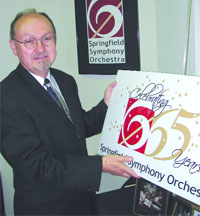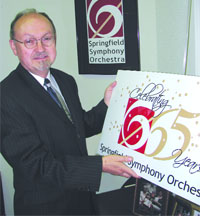
Concerted Effort
Now Celebrating 65 Years, the SSO is Feeling ‘Young’

Michael Jonnes says the 65th anniversary of the SSO is an appropriate time to celebrate the vitality and “youth” of the orchestra.
Michael Jonnes acknowledges that 65 isnt one those big anniversary years, like 25, 50, or 100.
But as executive director of the Springfield Symphony Orchestra, he knows that many institutions like his never reached that age not with the consolidations and shutdowns that accompanied a period, not so long ago, that he described as a trying time for the orchestra business.
Meanwhile, there is much to celebrate with the SSO, which doesnt need a round- number anniversary to stage a party but since it has one, it will. And unlike a person or a married couple marking 65, the orchestra in the City of Homes is feeling and acting quite young, said Jonnes, now marking his 10th year with the SSO.
There is a real sense of energetic youth here, he explained. And the 65th-anniversary celebration is a great way to say to the community, were alive, were vibrant, and were here to help the community financially and also culturally.
Kevin Rhodes, the SSOs colorful composer, now in his eighth year and who just signed on for another three years, deserves much of the credit for this energetic state of mind, said Jonnes, but there is more to this equation. Contributions from the community, including a number of businesses, coupled with continued strong support at the box office, has the SSO looking at a solid future at the same time as it marks an illustrious past.
All this comes together during a 65th-anniversary season that begins with an opening-night gala on Sept. 27, featuring pianist Norman Krieger, and continues on Oct. 11 with a pre-concert get-together and auction, followed by a show titled Elegant Cello, which will feature the works of Brahms, Elger, and Sibelus. The 11-event schedule also includes a Barry Manilow tribute, An Evening with Eartha Kitt, the annual Holiday Pops concerts, and something called Flights of Fancy featuring George Takei of Star Trek fame.
Rhodes, the SSOs sixth music director, laughed when asked if there was anything on the schedule that stood out everything does or something special for him theyre all special.
He did acknowledge, though, that he has always wanted to perform Strausss Also Sprach Zarathustra (a small portion of which is featured in Stanley Kubricks 2001: A Space Odyssey), and will get his chance during the Grand Finale on May 9.
Ive been waiting almost 30 years to do this one its always exciting to do something youve been wanting to do for years or, in this case, decades, he said, adding that, overall, the lineup is defined by variety, from pianist Peter Serkin performing Bach and Beethoven to the orchestra delivering favorites from operas such as The Barber of Seville and Rigoletto.
Rhodes, like Jonnes, noted that the 2008-09 schedule represents a good example of what might be described as the art and science of putting together such a lineup. There is at least six months of work that goes into the process, and a number of factors to consider, they said, from the number of musicians needed (and the accompanying cost of same) to whats been done recently and a desire not to repeat, to the carefully calculated appeal at the box office.
Theres a lot that goes into this, said Jonnes, whos had considerable practice between his time with the SSO and previous experience with several other orchestras, including the Brooklyn Philharmonic and the Jackson (Tenn.) Symphony Orchestra. Orchestras have to be very aware of whats happening musically at this time, and program music by Hispanics, Latinos, African-Americans there are many responsibilities.
In this issue, BusinessWest looks at all that goes into compiling a schedule, and why this one and 65 years of live music in Springfield are worthy of a celebration.
Sound of Success
As he offered some historical perspective on the SSO, Jonnes noted that 65 years ago, Springfield, like every city and town in the country, was preoccupied with World War II.
But, he noted quickly, the conflict, by that time, had tilted decidedly in the favor of the Allies, and many aspects of everyday life didnt grind to a complete halt. In fact, Alexander Leslie, who had already started one symphony orchestra in Greenfield, was advancing plans to form another in Springfield, figuring the time, and circumstances, were right for one.
The city already had a suitable venue Symphony Hall, which was built in 1913 and by then was the site for everything from car shows to boxing matches to high-school proms and, apparently, the requisite level of support for live music.
I dont really know all the history some of this is a little murky, said Jonnes, but by early 1944, when the SSO started, the trajectory of the war had changed, and it became clear to most that we would win it it was just a matter of time.
There was a sentiment to look toward the future, he continued, and thinking, what better way to show that Springfield is an attractive place to live and bring a business to? Or that a symphony orchestra was perceived, and is still perceived today, as one of those crucial cultural organizations that people believe that an enlightened city should have.
This sentiment remains today, he said, noting that, while the SSO suffered, as many orchestras did, in the 80s and 90s, when support waned and some institutions shut down or merged with others, it is now on solid footing with much to celebrate as it turns 65.
While some orchestras are just holding their own, the SSO is doing better than that, he explained, noting respectable attendance (2,100 or so per show, on average, with a capacity of 2,611), as well as what he considers to be greater appreciation for the orchestra, as well as its importance to the vitality of Springfield and the local economy.
Weve gone through the fires, he said of those difficult years, and I think were in better shape because of it. The Springfield symphony arrived in this state probably before many other orchestras, and certainly everyone here is far more involved with ensuring the success of this institution.
He said Rhodes, whom he described as Springfields rock star, has played a lead role, obviously, in raising the profile of the orchestra musicians are now traveling great distances to audition and be part of it and also elevating the product on stage to new heights.
The orchestra is playing probably as well as it ever has, he said. Musicians love playing with Kevin thats evident when you go inside the concert hall and there is just a great deal of energy surrounding this orchestra now.
Bass of Support
Looking ahead to the 65th-anniversary season, Jonnes said the lineup was put together after months of work exploring options, considering trends, weighing costs, and gauging box-office response.
Its all a careful balancing act, he explained, adding that it includes both music and mathematics, in roughly equal parts.
On the music side, there is consideration of whats been done recently, and the obvious desire to keep the product fresh, but also what Jonnes called the responsibility of American orchestras in the 21st century.
People say, youre a living museum, and thats true, he explained. So the great music written by Mozart and Beethoven, Brahms and Bach, and Tchaikovsky and Vogler that is always going to be the core of any season, because thats the core of the great classical music works.
But then, you have to play the music of American composers were an American orchestra, he continued. Also, its wise to bring in music thats never been played before or thats been played rarely.
Meanwhile, theres some calculated guesswork as to who will perform the music on stage alongside the orchestra, he said, adding that this is part of the mathematics, or budgetary part of the schedule-making process as well as the artistic side.
As an example, he noted that the decision to add the Smothers Brothers to the lineup for last season came with some trepidation about whether younger audiences knew of the performers or knew of them only as comedians with a short-lived television show from the 60s.
As it turned out, it was a good risk to take; the shows drew some of the largest crowds of the year.
Projected ticket sales are attached to each show under consideration, said Jonnes, adding that sometimes he will tell Rhodes that he simply cant afford a requested line-up, prompting more give and take.
Rhodes, who said he appreciates this process as well as the executive directors willingness to start with what the conductor might like to do artistically, compared schedule-building to stacking LEGOs eventually, everything comes together but sometimes, it takes a while.
Ideas begin to emerge, and then you reshuffle, reshuffle, and reshuffle, and eventually come up with a first draft, he explained. And then you get down to the real serious business of attaching dollars to these pieces meaning how many musicians do we need, how much rehersal time is needed, how many soloists will we need, and what do we have to pay for them? And then you look at the expense side.
About nine months later, a schedule emerges, Rhodes told BusinessWest, adding that the 2008-09 roster meets the artistic and budgetary criteria for what he called a blockbuster year.
The Big Finale
Its one that will include everything from Bach to Beethoven to Bolero, and wrap up with Also Sprach Zarathustra, which Rhodes is quite anxious to bring to the stage.
We all know the first two minutes, but we seldom get to hear the remaining 36 minutes, he said, and the Springfield symphony has never played the entire piece. This going to be fun and inspiring.
Thats what Alexander Leslie had in mind when he started the SSO back when there was a war on.v
George OBrien can be reached at [email protected]




